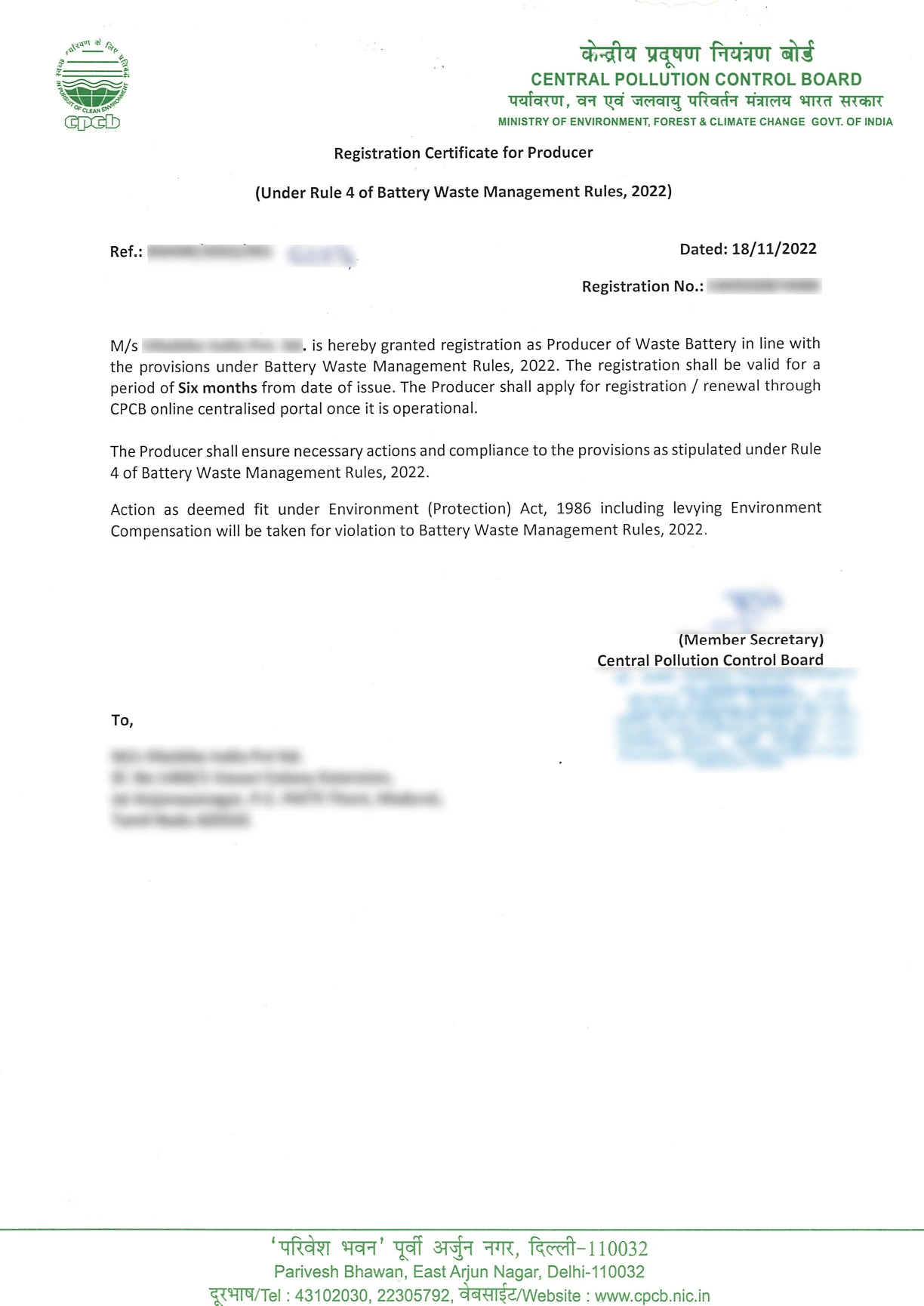INTRODUCTION
In recent years, the demand for the Battery has grown at an exponential rate. Investment
has poured into the battery industry in order to develop long-term storage solutions that
will aid in the energy transition. As the world increasingly replaces fossil fuel power with
emission-free electrification, batteries are becoming an essential storage tool to help with
the transition. With the emphasis now on renewable energy, the use of electricity is gaining
traction. As a result, massive amounts of battery waste would be generated. To deal with
the situation of rising battery waste, a proactive policy is required. With this in mind, the
government issued the Battery Waste Management Rules, 2022.
On August 22, 2022, the Ministry of Environment, Forests, and Climate Changes published
the battery waste management rules, 2022, replacing the Battery (Management & Handling)
Rules, 2001, in order to ensure environmentally sound management of used batteries.
Registration of Producers: According to Rule 4 of the BWM Rules 2022, every Producer and
person or entity involved in the manufacture of batteries shall be required to register with
the CPCB through a centralised online portal, for which an application in Form 1 (A) must be
submitted to the CPCB. Producer shall file for renewal of registration in Form 1(A) before
sixty days of its expiry.
According to BWM Rules, 2022, A producer is defined as an entity that manufactures and sells, sells, and imports batteries, including refurbished batteries, including in equipment, under its own brand or its own brand produced by other manufacturers or suppliers.
BWM Rules function is based on the concept of Extended Producer Responsibility (EPR),
according to which battery producers are responsible for collecting, recycling, and
refurbishing waste batteries and using recovered materials from waste to make new
batteries.
EPR for Producer of Battery: 'Extended Producer Responsibility' refers to the responsibility of any Producer of Battery to manage Waste Battery in an environmentally sound manner in order to protect human health and the environment from any adverse effects that may result from any substance contained in Waste Battery.
Registration of Refurbishers and Recyclers: All refurbishers and recyclers must register with the State Pollution Control Board on the centralised portal to receive a one-time registration.
Refurbishers and recyclers must submit quarterly returns in Form 4 detailing the quantity of used batteries collected or received from various producers or entities, the quantity of refurbished and recycled batteries, and the quantity of hazardous and/or other waste generated after refurbishment and disposal.
Government Guideline for Battery Waste Management 2022
View PDF
Applicability:
These rules apply to all entities involved in the collection, segregation, transportation, refurbishment, and recycling of all types of waste batteries, including the Producer, dealer, and consumer. The rules cover all types of batteries, including portable, electric vehicles, automotive, and industrial batteries.
These rules do not apply to batteries used in equipment related to the protection of essential security interests, such as arms, ammunition, war material, and those designed specifically for military purposes; or equipment intended to be launched into space.
Application process for registration of BWM to CPCB
Online Centralized Portal of CPCB is still under development, so applications for registration are currently accepted offline. The steps for submitting an application to the CPCB in offline mode by the Producer or manufacturer are listed below:
Documentation: BWM Registration begins with documentation. First, Aleph Team prepares and compiles all the required information and documents before imitating the project for registration as per CPCB norms on behalf of the Producer.
Application submission: Aleph team will apply to CPCB on behalf of the Producer for registration by submitting the prescribed application form through the mail and a hardcopy of the application to the Central Pollution Control Board. Along with the application form, we will submit the necessary documents.
Review of application: After receiving the completed application, CPCB will review it.
Grant of Registration: Following the review of the application, registration will be granted initially for six months. Once the online portal is operational, registration may be renewed for an additional six-month period. Meanwhile, the collection of application fees will be deferred and will be realized at the time of registration through the centralized online portal.
Sample of a Grant Certificate for BWM
Documents Required for Registration of Producer:
- Self-attested copy of GST Certificate
- TIN number
- CIN number
- Aadhar Card of the authorised person
- Pan Card of Company
Conclusion:
As per EPR for Battery Waste Management, producers of batteries are responsible for managing their waste batteries in an environmentally sound manner. The person or entity involved in the manufacturing of batteries shall be required to register with the CPCB through a centralised online portal to obtain an EPR registration certificate for batteries waste management.
Aleph India is a one-stop shop for all of your compliance requirements. We assist manufacturers, and importers in obtaining certification from various ministries under various schemes of the government of India that are required to manufacture, sell, export, or import goods. Our compliance experts will guide you through each step of the process to ensure that everything runs smoothly and on time to meet your compliance requirements.
If you have any queries regarding the EPR Registration for BWM, please call us at 9990136656 for a free consultation. We will meet your expectations by providing quick and efficient EPR Registration services for battery waste management. Our experts will assist you in obtaining an EPR Registration certificate on time by guiding you through each step of the process.











